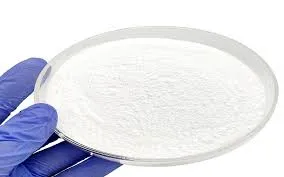Sodium Thiocyanate Solution Properties, Applications, and Safety Considerations
Sodium thiocyanate (NaSCN) is an inorganic compound that plays a pivotal role in various industrial and scientific applications. As a salt, it exhibits unique properties that make it versatile for use in diverse fields such as chemical synthesis, pharmaceuticals, agriculture, and even biochemistry. In this article, we will explore the properties, applications, and safety considerations of sodium thiocyanate solutions.
Properties of Sodium Thiocyanate
Sodium thiocyanate is a white, crystalline solid that is highly soluble in water. Its solubility is a significant property that makes it particularly useful in creating solutions for various applications. When dissolved in water, it dissociates into sodium ions (Na⁺) and thiocyanate ions (SCN⁻). The resulting aqueous solution is relatively neutral, with a pH close to that of water.
The molecular structure of thiocyanate features a central sulfur atom bonded to a carbon atom, which in turn is bonded to a nitrogen atom. This unique structure contributes to its reactivity and ability to form complexes with transition metals, which is of great interest in various chemical processes. Sodium thiocyanate's properties extend beyond its basic chemistry; it is known for its hygroscopic nature, meaning it can absorb moisture from the atmosphere, thereby impacting its handling and storage.
Applications of Sodium Thiocyanate Solution
1. Chemical Synthesis Sodium thiocyanate is widely used in organic synthesis. It serves as a source of the thiocyanate ion, which can be employed in reactions to synthesize various organic compounds. One notable application includes its use in the synthesis of isothiocyanates, which are valuable in medicinal chemistry due to their biological activities.
2. Pharmaceuticals In the pharmaceutical industry, sodium thiocyanate has applications in the formulation of medications. It can act as a stabilizing agent in certain drug preparations and has been studied for its potential therapeutic effects, particularly in managing conditions related to hyperthyroidism.
3. Agriculture Sodium thiocyanate solutions are utilized in agriculture as a herbicide. It acts by interfering with the growth of specific weeds, thereby aiding in crop protection. Additionally, it has applications in soil amendments to improve nutrient availability.
sodium thiocyanate solution

4. Analytical Chemistry Sodium thiocyanate is employed in various analytical techniques. It can be used in titration methods to determine the concentration of certain metal ions and in colorimetric assays, providing a means to analyze and quantify substances in a solution.
5. Biochemistry In biochemistry, sodium thiocyanate solutions are often used in laboratory procedures, particularly in protein studies. It can help denature proteins, facilitating the analysis of protein structure and function.
Safety Considerations
While sodium thiocyanate is widely utilized, it is essential to consider safety when handling this compound. It is classified as a low-toxicity substance, but exposure can still present risks. Inhalation or ingestion of concentrated sodium thiocyanate can lead to health issues, including respiratory irritation, nausea, and other gastrointestinal disturbances.
When working with sodium thiocyanate solutions, appropriate personal protective equipment (PPE) should be used, including gloves, goggles, and lab coats. It is also crucial to work in well-ventilated areas or fume hoods to minimize inhalation risks.
Additionally, sodium thiocyanate should be stored properly to prevent moisture absorption and degradation. Containers should be sealed tightly and kept in a cool, dry place away from incompatible substances, such as strong acids. Safety data sheets (SDS) should always be consulted for handling, storage, and disposal guidelines.
Conclusion
In summary, sodium thiocyanate solutions exhibit a range of properties that enable their use in various industrial and scientific applications. From chemical synthesis to agricultural practices and analytical chemistry, sodium thiocyanate is an invaluable chemical compound. However, appropriate safety measures must be taken when handling it to mitigate potential health risks. As research continues, the scope of applications for sodium thiocyanate may expand, further solidifying its significance in both industrial and laboratory settings.

